
The politics of Equatorial Guinea take place in a framework of a presidential republic, whereby the President is both the head of state and head of government. Executive power is exercised by the government. Legislative power is vested in both the government and the Chamber of People's Representatives

Papua New Guinea, officially the Independent State of Papua New Guinea, is a country in Oceania that comprises the eastern half of the island of New Guinea and its offshore islands in Melanesia. It shares its only land border with Indonesia to the west and it is directly adjacent to Australia to the south and the Solomon Islands to the east. Its capital, located along its southeastern coast, is Port Moresby. The country is the world's third largest island country, with an area of 462,840 km2 (178,700 sq mi).

The prehistory of Papua New Guinea can be traced to about 50,000–60,000 years ago, when people first migrated towards the Australian continent. The written history began when European navigators first sighted New Guinea in the early part of the 17th century.

The politics of Papua New Guinea takes place in a framework of a parliamentary representative democratic multi-party system, whereby the prime minister is the head of government. Papua New Guinea is an independent Commonwealth realm, with the monarch serving as head of state and a governor-general, nominated by the National Parliament, serving as their representative. Executive power is exercised by the government. Legislative power is vested in both the government and parliament.

A semi-presidential republic, or dual executive republic, is a republic in which a president exists alongside a prime minister and a cabinet, with the latter two being responsible to the legislature of the state. It differs from a parliamentary republic in that it has a popularly elected head of state; and from the presidential system in that the cabinet, although named by the president, is responsible to the legislature, which may force the cabinet to resign through a motion of no confidence.

Sir Julius Chan is a Papua New Guinean politician who served as Prime Minister of Papua New Guinea from 1980 to 1982 and from 1994 to 1997. He is Member of Parliament for New Ireland Province, having won the seat in the 2007 national election. He is also the current Governor of New Ireland Province, since 2007. On 26 May 2019, Prime Minister Peter O'Neill announced he would soon resign and that he wished for Sir Julius to succeed him. An outgoing Prime Minister does not, however, have the power to appoint his successor, and the following day O'Neill delayed his own formal resignation. He was also a leading figure in his country during the years-long Bougainville conflict.

The People's Progress Party is a political party in Papua New Guinea.

Ratu Inoke Matavasona Kububuabola is a Fijian politician and Cabinet Minister. He is the former leader of the opposition and Minister for Foreign Affairs.
The Sandline affair was a political scandal that became one of the defining moments in the history of Papua New Guinea, and particularly the conflict in Bougainville. It brought down the government of Sir Julius Chan, and took Papua New Guinea to the verge of a military revolt. The event was named after Sandline International, a UK-based private military company force.
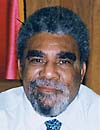
Sir Mekere Morauta was a Papua New Guinean politician and economist who served as the 7th Prime Minister of Papua New Guinea from 1999 to 2002. Inheriting a depressed economy and a fractious legislature, he embarked on fundamental reforms of the country's economy and political system.
Carlos Correia was a Bissau-Guinean politician who was Prime Minister of Guinea-Bissau from 17 September 2015 to 12 May 2016. Previously he was Prime Minister from 27 December 1991 to 26 October 1994, from 6 June 1997 to 3 December 1998, and from 5 August 2008 to 25 December 2008.
Sir Christopher Seseve Haiveta is a Papua New Guinean politician. He was the head of the Pangu Party of Papua New Guinea and a member of National Parliament. In 1993 he was named Deputy Prime Minister of Papua New Guinea. He also served as the governor of Gulf Province twice. Haiveta served as Minister of Finance in the government of Julius Chan from 1994 to 1997. They both resigned in 1997 during the Sandline Affair. Soon after that, Haiveta briefly became foreign minister but had left that post by the end of 1997. He became governor of Gulf Province for the first time in 1997, lost that post in 1998 and became governor again in 2002. He lost the election July 2007, and left the governorship later that year after the parliamentary elections. He worked for the Prime Minister's department following his election loss in 2007.
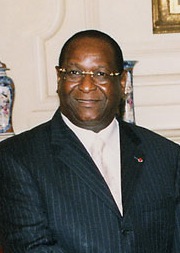
Lansana Kouyaté is a Guinean politician and diplomat who served as Prime Minister of Guinea from 2007 to 2008. Previously he was Executive Secretary of the Economic Community of West African States (ECOWAS) from 1997 to 2002.

Sir Michael Thomas Somare was a Papua New Guinean politician. Widely called the "father of the nation", he was the first Prime Minister after independence. At the time of his death, Somare was also the longest-serving prime minister, having been in office for 17 years over three separate terms: from 1975 to 1980; from 1982 to 1985; and from 2002 to 2011. His political career spanned from 1968 until his retirement in 2017. Besides serving as PM, he was minister of foreign affairs, leader of the opposition and governor of East Sepik Province.
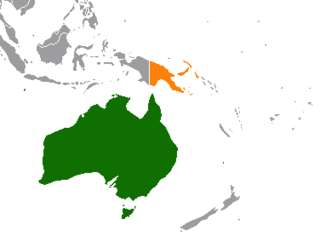
Foreign relations exist between Australia and Papua New Guinea. Papua New Guinea is Australia's closest neighbour and a former colony of Australia. Both nations share the same continent in the Oceania region. Papua New Guinea has developed much closer relations with Australia than with Indonesia, the only country with which it shares a land border. The two countries are Commonwealth realms. In contemporary times, Papua New Guinea is one of the largest recipients of Australian aid. Some critics have pointed to instances where this has led to an outsized Australian influence on Papua New Guinea politics.

Corruption is rife in Papua New Guinea (PNG). According to The Economist, "PNG's governments are notorious for corruption, and ever run the risk of turning the state into a fully-fledged kleptocracy".
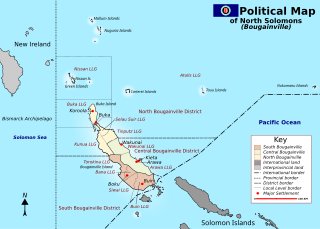
The Bougainville conflict, also known as the Bougainville Civil War, was a multi-layered armed conflict fought from 1988 to 1998 in the North Solomons Province of Papua New Guinea (PNG) between PNG and the secessionist forces of the Bougainville Revolutionary Army (BRA), and between the BRA and other armed groups on Bougainville. The conflict was described by Bougainvillean President John Momis as the largest conflict in Oceania since the end of World War II in 1945, with an estimated 15,000–20,000 Bougainvilleans dead, although lower estimates place the toll at around 1,000–2,000.
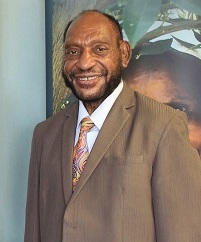
The Right Honourable Grand Chief Sir Peter Ipatas, KBE, GCL, MP is a Papua New Guinean politician and businessman, and is the current governor of Enga province. Ipatas has been re-elected to the parliament for four consecutive terms since 1997. He is commonly known throughout the country as the "Action Governor". Chief Ipatas is also known as the Father of Free Education Policy in the country. He first assumed office in 1997.
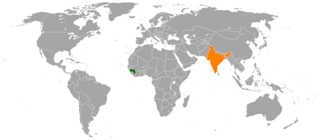
The international relations between Guinea and India have been cordial and friendly. India maintained an embassy in Conakry, but shut it down after more than 2 decades of operation in 1988. Subsequently, the Embassy of India in Abidjan, Côte d'Ivoire was jointly accredited to Guinea. Guinea opened its embassy in New Delhi in April 2012. India has maintained an honorary consul in Guinea since 1989.

Equatorial Guinea and India maintain diplomatic relations.















